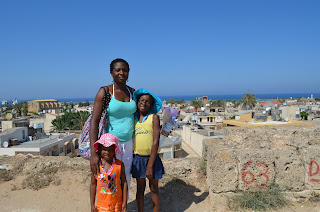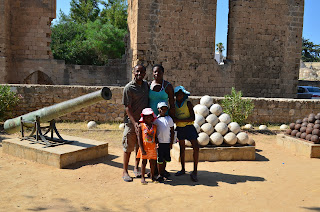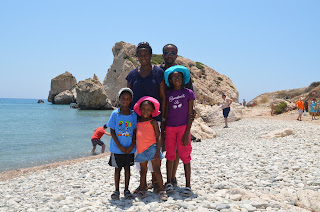We had to go through passport control as we are in another country.
By 12:30 am, we had picked up our rental car, and Paschal had to drive English-style: on the left side of the road, in a car with the gear box on the left hand side. Imagine trying to train your mind to do the 'wrong' thing all the time. We thank God that we did not get into an accident or wreck the car.
In North Cyprus, the Turkey flag is always seen next to the Turkish/North Cyprus. In the South, the flag is next to the Greek flag. At the passport control, we told them we were going to South Cyprus and they did not stamp our passports.
This is complex island. Divided between North and South, the north is controlled by Turkey and using the Turkish Lira as its currency, while the south has close ties to Greece. The South is in the European Union, using the Euro currency. The two countries are in a standstill, with the United Nations peace keeping forces keeping the parties apart.
The bitterness is deep, and unfortunately is very clear when walking through the last divided city today: Lefkosia, A/K/A Nicosia. Each side controlled by respective countries in the Cypriot conflict. You cannot drive a rental car from North to South. You have to walk pass the border post, present passport to two different passport control offices, less than 40 meters apart from one another. With a US passport, there is little trouble crossing the border - as the guy at the Otopark (car park) on the Turkish side said to us - "you have the right passport." While one side doesn't put you through much scrutiny, the Turkish side has to review your papers, stamp "visa" before you can exit or enter. However they did this on a piece of paper not the passport - people say if they stamp your passport - the Greek Cypriot side may put you through much hassle.
There are several military posts in the North; it is forbidden to take photographs of these posts or even near them, apparently for security reasons. We saw none of these in the south. To an outsider, what is going on between both sides does not make sense; but the history and accusations of persecution, mass killings, looting of arts by one side, 'abandoned property" issues--are too much; and unfortunately, it will take years and great leaders from both sides to get this resolved.
Another observation: practically every town or city has at least two names: the local name and an Anglicized names. This can be confusing when one is trying to find a place.
Pool v. Beach in North Cyprus. - We had a pool at our villa and we went to the beach near Salamis.. which is a old kingdom that we did not get to see. However the beach is phenomenal - warm waters of the Mediterranean with a very shallow entry - great for swimming with the kids and not crowded...FUN
Famagusta/Gazimagusta,North Cyprus
This is a very old city founded about 11th century BC and controlled by various kingdoms: Roman, Egyptians, Franks, Genoans and Venetians. We went up the Venetian walls:
Then to a fascinating building: Lala Mustafa Pasa Mosque (Cathedral of Agios Nikolaos). Built in the 14th Century, this is an elegant, open church. But when the Ottomans took over, it was converted to a Mosque in 1571. But it is every bit a Church:
But-for the Minaret outside, one would think this is another Cathedral:
And then to the ruins of the Venetian Palace:
South Cyprus
We drove to Limassol (Lemesos), a city in South Cyprus. We visited the old Aphrodite temple, and the rock where she apparently emerged from.
From there, we went to have lunch is a very local restaurant (thanks to Time Out Cyprus ). We were lucky to find the place, and when we got there, the outside was very quiet, but the inside was buzzing with a number of locals. No one but one of the cooks and the cashier spoke English. We have the best Greek Cypriot lunch. The food kept coming, while we tried to keep up with the kitchen staff. Quick side note - they had raw onions on the tables with the skins on - we heard from one of the men that the locals cut them up and eat with their meals - Amaka ate one--and it helps with the digestive system.
Took picture with the cook.





































No comments:
Post a Comment